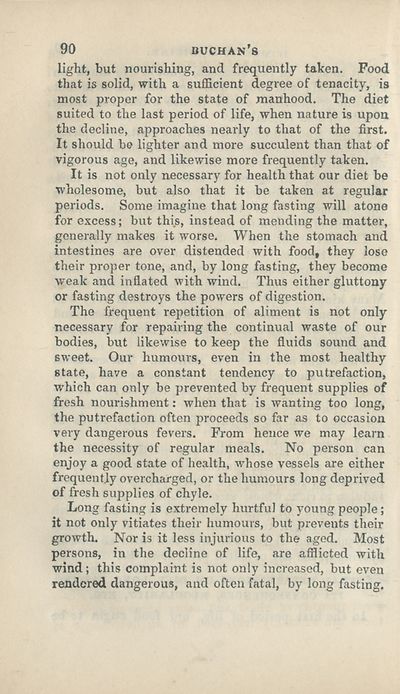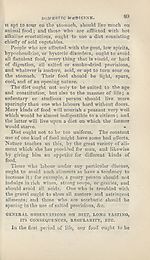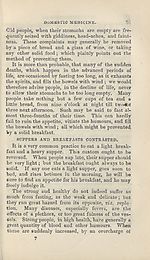Diseases > Domestic medicine
(124)
Download files
Complete book:
Individual page:
Thumbnail gallery: Grid view | List view

90 buchan's
light, but nourishing, and frequently taken. Food
that is solid, with a sufficient degree of tenacity, is
most proper for the state of manhood. The diet
suited to the last period of life, when nature is upon
the decline, approaches nearly to that of the first.
It should he lighter and more succulent than that of
vigorous age, and likewise more frequently taken.
It is not only necessary for health that our diet be
wholesome, but also that it be taken at regular
periods. Some imagine that long fasting will atone
for excess; but this, instead of mending the matter,
generally makes it worse. When the stomach and
intestines are over distended with food, they lose
their proper tone, and, by long fasting, they become
weak and inflated with wind. Thus either gluttony
or fasting destroys the powers of digestion.
The frequent repetition of aliment is not only
necessary for repairing the continual waste of our
bodies, but likewise to keep the fluids sound and
sweet. Our humours, even in the most healthy
state, have a constant tendency to putrefaction,
which can only be prevented by frequent supplies of
fresh nourishment: when that is wanting too long,
the putrefaction often proceeds so far as to occasion
very dangerous fevers. From hence we may learn
the necessity of regular meals. No person can
enjoy a good state of health, whose vessels are either
frequently overcharged, or the humours long deprived
of fresh supplies of chyle.
Long fasting is extremely hurtful to young people;
it not only vitiates their humours, but prevents their
growth. Nor is it less injurious to the aged. Most
persons, in the decline of life, are afflicted with
wind; this complaint is not only increased, but even
rendered dangerous, and often fatal, by long fasting.
light, but nourishing, and frequently taken. Food
that is solid, with a sufficient degree of tenacity, is
most proper for the state of manhood. The diet
suited to the last period of life, when nature is upon
the decline, approaches nearly to that of the first.
It should he lighter and more succulent than that of
vigorous age, and likewise more frequently taken.
It is not only necessary for health that our diet be
wholesome, but also that it be taken at regular
periods. Some imagine that long fasting will atone
for excess; but this, instead of mending the matter,
generally makes it worse. When the stomach and
intestines are over distended with food, they lose
their proper tone, and, by long fasting, they become
weak and inflated with wind. Thus either gluttony
or fasting destroys the powers of digestion.
The frequent repetition of aliment is not only
necessary for repairing the continual waste of our
bodies, but likewise to keep the fluids sound and
sweet. Our humours, even in the most healthy
state, have a constant tendency to putrefaction,
which can only be prevented by frequent supplies of
fresh nourishment: when that is wanting too long,
the putrefaction often proceeds so far as to occasion
very dangerous fevers. From hence we may learn
the necessity of regular meals. No person can
enjoy a good state of health, whose vessels are either
frequently overcharged, or the humours long deprived
of fresh supplies of chyle.
Long fasting is extremely hurtful to young people;
it not only vitiates their humours, but prevents their
growth. Nor is it less injurious to the aged. Most
persons, in the decline of life, are afflicted with
wind; this complaint is not only increased, but even
rendered dangerous, and often fatal, by long fasting.
Set display mode to:
![]() Universal Viewer |
Universal Viewer | ![]() Mirador |
Large image | Transcription
Mirador |
Large image | Transcription
| Antiquarian books of Scotland > Diseases > Domestic medicine > (124) |
|---|
| Permanent URL | https://digital.nls.uk/119889630 |
|---|
| Description | Thousands of printed books from the Antiquarian Books of Scotland collection which dates from 1641 to the 1980s. The collection consists of 14,800 books which were published in Scotland or have a Scottish connection, e.g. through the author, printer or owner. Subjects covered include sport, education, diseases, adventure, occupations, Jacobites, politics and religion. Among the 29 languages represented are English, Gaelic, Italian, French, Russian and Swedish. |
|---|

